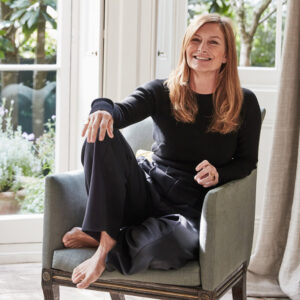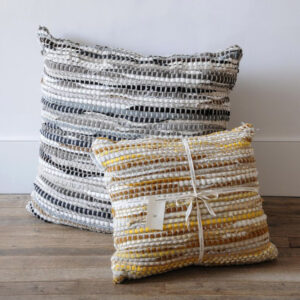Rose Uniacke supports HCA with new textiles range
25th August 2021 | ANNOUNCEMENTS
 Designer Rose Uniacke has partnered with the Heritage Crafts Association (HCA) to create ‘Remnant Weave’, a new fabric remnants collection, the profits of which will be donated to help safeguard endangered artisanal and craft skills in the UK.
Designer Rose Uniacke has partnered with the Heritage Crafts Association (HCA) to create ‘Remnant Weave’, a new fabric remnants collection, the profits of which will be donated to help safeguard endangered artisanal and craft skills in the UK.
Rose Uniacke has long been committed to championing traditional skills and craftspeople. Over the years, she has nurtured relationships with an exceptional group of highly skilled artisans and craftspeople who have the experience, virtuosity and sensitivity to interpret her designs.
Research published by the HCA in May 2021 showed that Covid-19 has exacerbated the issues faced by our most at-risk craft skills, after 18 months of the pandemic which saw many craftspeople and their businesses pushed to the brink of collapse.
 The new ‘Remnant Weave’ cushions are handwoven in the UK with Rose Uniacke fabric remnants. The inner pads are handmade with 100% British wool, which is a natural, eco-friendly and healthy alternative to hollowfibre and feather fillings. As they are made with remnants, the colours and textures of the cushions on sale will change according to the materials available at the time.
The new ‘Remnant Weave’ cushions are handwoven in the UK with Rose Uniacke fabric remnants. The inner pads are handmade with 100% British wool, which is a natural, eco-friendly and healthy alternative to hollowfibre and feather fillings. As they are made with remnants, the colours and textures of the cushions on sale will change according to the materials available at the time.
The HCA Red List of Endangered Crafts now lists 56 crafts as critically endangered, including damask weaving, fabric pleating using moulds, and frame knitting, meaning that they are at serious risk of no longer being practised in the UK. A further 74 are listed as endangered; there are enough craftspeople to transmit their skills to the next generation, but there are serious concerns about their ongoing viability.
All profits from the sale of the Remnant Weave collection will be donated to the HCA to help support and promote traditional crafts in the UK. Members of the public can also donate directly to support the HCA’s work at heritagecrafts.org.uk/donate.
Rose Uniacke said:
“Now more than ever, the survival of small artisanal businesses is under threat, and with them the traditions and skills of hand-built craftsmanship which they keep alive. I am delighted to be working with the Heritage Crafts Association to help ensure these crafts are available to the next generation.
Daniel Carpenter, HCA Operations Director, said:
“We are thrilled to be working in partnership with Rose Uniacke on a project that combines sustainability, design and an appreciation of craft skill. We know that the future is going to be beset with global challenges, and we strongly believe that our repository of skills and knowledge will play a vital part in helping future generations tackle them. We cannot afford to lose them now.”
‘Remnant Weave’ cushions and wall hanging are available to purchase at www.roseuniacke.com with prices starting from £420.
About Rose Uniacke:
Rose Uniacke is an architectural and interior designer, antiques dealer and furniture designer who has garnered a world-class reputation for her signature aesthetic that is unrivalled in its quiet simplicity, sensitivity, and sophistication. A master of space and light, Uniacke restores, remodels and restructures rooms and buildings, often stripping a structure back to its bare bones, balancing texture, scale, and proportion for an inimitable level of refinement.
From concept to completion, Uniacke works closely with skilled craftspeople to ensure a space is as inviting as it is functional, combining a richness of character, with warmth, serenity, and timeless elegance. Uniacke began her career at a furniture-restoration workshop, sparking an interest in antiques and furniture that would lay the foundation for her career. A move to France in 1994 saw Uniacke begin to really hone her craft and eye as she started to buy antiques to sell in her mother’s store, the antiques dealer Hilary Batstone.
Several years later, back in England, Uniacke was asked to help design a home; informed by an innate appreciation for classic design, Uniacke embarked on her first design project.
Uniacke and her team now work on a broad portfolio of projects internationally, from London villas and apartments, to listed manor houses and global company headquarters, all for a varied yet discerning client base. The Rose Uniacke team is based in Pimlico, central London, in spacious premises that serves as a gallery which sells antiques and Rose Uniacke pieces and, below stairs – the project and product design studio.
In 2010 Rose Uniacke launched Rose Uniacke Editions, a collection of furniture, lighting, and accessories. The collection was the organic solution to Rose’s own personal hunt for elegant and distinctive items for her own home. When clients asked for similar pieces, it was a natural progression for her to produce them. Today the range continues to grow and calls upon the finest contemporary craftspeople to create the collection. In 2017, the Rose Uniacke offer expanded with the launch of Rose Uniacke Fabric Collection, a unique collection of custom-dyed cloth, in Uniacke’s distinctive colour palette. Beautifully understated and above all functional, the collection is suitable for upholstery, furnishings, wall coverings and drapery. Now coveted globally, the collection embodies the company’s driving ethical and environmental ethos, using almost entirely natural fibres and sustainable production methods.
Autumn 2021 will see Uniacke open the doors to a new shop, her second, on the Pimlico Road, located opposite the existing Rose Uniacke Gallery. The new space, set over two floors, will be devoted to textiles, housing the expansive RU Fabric collection on the ground floor and a curated selection of table, kitchen and bed linen and cashmere – plus the brand’s new range of environmentally conscious paints – downstairs.
Rose Uniacke Editions which spans furniture, lighting, and gifts – plus Rose’s expert curation of antiques – will continue to be available at the Rose Uniacke Gallery, 76-84 Pimlico Road and online at roseuniacke.com.
About the HCA Red List of Endangered Crafts
The 2021 edition of the HCA Red List of Endangered Crafts was led by Mary Lewis, HCA Endangered Crafts Manager, supported by the Pilgrim Trust. The project runs alongside Mary’s work in identifying and developing interventions to improve the prospects of such crafts, funded by The Swire Charitable Trust, The Garfield Weston Foundation and The Dulverton Trust.
For the 2021 edition, 244 crafts have been assessed to identify those which are at greatest risk of disappearing. Of the 134 crafts featured on the Red List, four have been classified as extinct, 56 as critically endangered and 74 as endangered. The remaining 110 are classed as currently viable.
Drawing on information such as the current number of craftspeople and trainees, the average age of practitioners, opportunities to learn, and other issues affecting the future of the crafts, including the impact of COVID-19, the research assesses how likely it is that the craft skills will be passed on to the next generation. From armour making and arrowsmithing to wig making and woodturning, each has been assigned to one of four categories: extinct, critically endangered, endangered, or currently viable.
Four crafts are known to have become extinct in the UK in the last fifteen years (cricket ball making, gold beating, lacrosse stick making, and paper mould and deckle making) with one more (sieve and riddle making) brought back from extinction. At the other end of the spectrum, viable crafts are defined as those for which there are sufficient craftspeople to pass on the craft skills to the next generation, though crafts in the currently viable category face real challenges and require continued monitoring.
For the purposes of this research, a heritage craft is defined as “a practice which employs manual dexterity and skill and an understanding of traditional materials, design and techniques, and which has been practised for two or more successive generations.” The research focuses on craft practices which are taking place in the UK today, including crafts which have originated elsewhere.
About the Endangered Crafts Fund
The Heritage Crafts Association’s Endangered Crafts Fund was set up in 2019 to ensure that the most at-risk heritage crafts within the UK are given the support they need to thrive. The Fund is used to support makers and trainees who wish to develop or share their skills in the crafts that have been identified as being most at risk.
To date, 27 projects have been funded with support from the Garfield Weston Foundation, the Dulverton Trust, the Sussex Heritage Trust, Allchurches Trust, the Radcliffe Trust and the Swire Charitable Trust.
Anyone wishing to donate to the fund may do so securely online here. Alternatively, please send a cheque made payable to ‘Heritage Crafts Association’ with an accompanying note specifying ‘Endangered Crafts Fund’ to: Heritage Crafts Association, 27 South Road, Oundle, Peterborough PE8 4BU.
